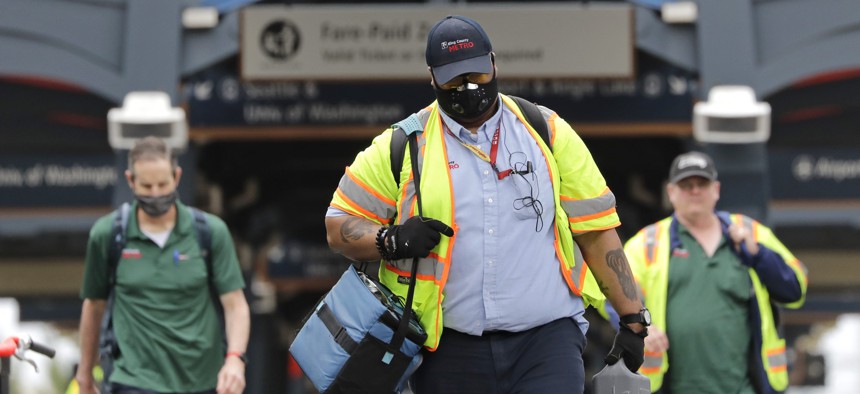Virus is Squeezing State and Local Public Workers’ Personal Finances, Survey Finds

King County Metro bus workers walk off of a transit platform Monday, May 11, 2020, in Seattle. AP Photo/Elaine Thompson

Connecting state and local government leaders
Employees are also worried about the amount of debt they are carrying, while some said they will save less for retirement.
Over half of the state and local government employees who responded to a new survey said that they and their family have taken a financial hit due to the coronavirus outbreak, and nearly half expected the effects of this blow to worsen over the year ahead.
These findings come at a time when Americans working in a wide range of industries have been faced with job-losses and financial turmoil because of the sharp economic downturn that the virus has caused. In addition, many state and local governments are either implementing or considering layoffs and furloughs as they seek to balance strained budgets.
During April and May, the number of state and local government jobs nationwide fell by about 1.5 million, according to federal estimates.
The Center for State and Local Government Excellence released the results of the poll on Thursday. It’s based on responses from 1,008 state and local public sector employees who work in a variety of jobs. The survey was conducted between May 4 and 20.
Forty-six percent of respondents said that their household finances had been “negatively impacted somewhat” by the pandemic. And another 10% said that these impacts were “significant.”
Meanwhile, 37% said they expected this financial impact to worsen “somewhat” in the year ahead and another 10% anticipated that the financial damage will grow significantly worse.
Among the survey’s other findings: 57% of respondents reported that debt is either a major or minor problem for them and their family, and 26% said they will reduce the amount they are saving for retirement during the next year.
About half the survey participants said they were concerned about having their pay reduced and a roughly equal share said they were worried about getting furloughed or having work hours cut.
Orlando Cruz, senior vice president with the International City/County Management Association Retirement Corporation, said what is emerging from the pandemic so far is a “tale of three public servants”: those on the front lines of the health crisis and other “essential” employees who are reporting to workplaces, those working remotely, and those getting laid off or furloughed.
“There's not one municipality that we deal with,” he said, “that has not been impacted."
In addition to inquiring about workers’ personal finances, the survey asked about other issues.
The results also show, for instance, that among a subset of 989 respondents, 42% have been working remotely during the disease outbreak and not going into their workplace. Another 21% said they are mostly working remotely but do go to their workplace on occasion.
It’s a drastic shift from the workplace arrangements that public sector workers had before the pandemic—among 688 respondents, 82% said they did not work remotely prior to the virus.
State government workers accounted for 58% of survey respondents and local government employees for the other 42%. Just over half worked in education jobs, 16% in public safety, 13% in health and human services, 5% in public works or utilities, and 5% in transportation. The remainder worked in parks and recreation, finance and administration, or other jobs.
Seventy percent of the survey participants reported total annual household incomes under $75,000 and 46% under $50,000.
While financial issues were a clear concern for many respondents, personal safety and family health is also a top priority.
Upwards of 80% said keeping their family safe from the virus was something they were at least somewhat concerned about with their job going forward. And 80% expressed similar degrees of concern about staying protected from the virus when they return to their workplace.
Joshua Franzel, president and CEO of the Center for State and Local Government Excellence, said one of the key overall findings of the survey “is the vulnerability that state and local workers are kind of feeling financially and just from a personal health standpoint.”
The complete survey results can be found here.
Bill Lucia is a senior reporter for Route Fifty and is based in Olympia, Washington.

NEXT STORY: Kansas City Government Employees: 'Please Don’t Rush to Reopen'





